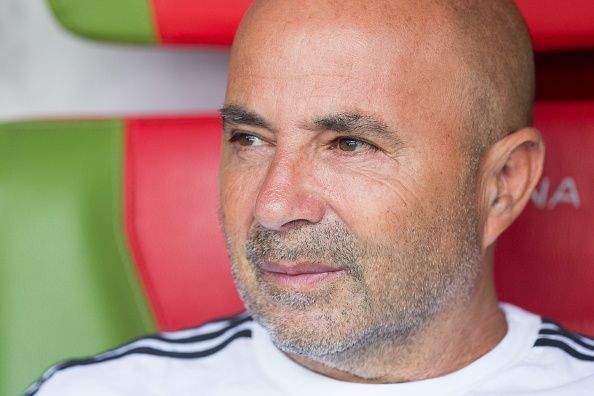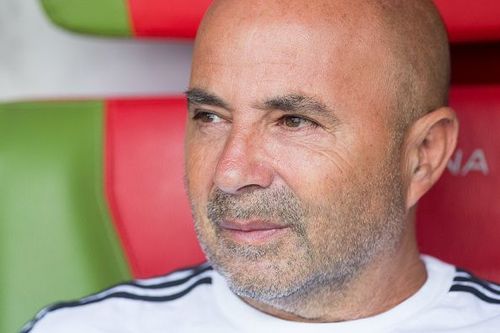
Is sacking Jorge Sampaoli another mistake by messy Argentina?

Just over a day ago, Argentine Football Association (AFA) officially announced the news of mutual agreement to terminate former coach Jorge Sampaoli’s contract. The departure of the 58-year-old, who was in FIFA’s list of top 3 managers after guiding Chile to a famous Copa America triumph in 2015, became a popular demand, as his dismal Argentina side performed poorly in the group stages of World Cup 2018, and were ultimately eliminated after round-of-16 defeat against eventual champions France.
Sampaoli took charge only about a year ago, leaving the lucrative managerial position of Spanish top division side Sevilla, which was surprising indeed, as his compatriots, Diego Simeone and Mauricio Pochettino, reportedly rejected the same offer to concentrate on their club management careers in Europe.
The decision was a massive gamble by Sampaoli, because back at that time, Argentina were in absolute shambles due to extreme discontinuity of management and tactical ideas, and to make things worse, the Latin American giants were on the verge of missing out on a World Cup spot.
Even before taking the job, Sampaoli knew, he would have to take all the blame for any failure to bring back glory days of Argentine football. However, he had a long cherished dream of getting involved with the Albiceleste, something he failed to achieve as a player unlike Simeone and Pochettino, and an offer from AFA was too tempting for him to ignore.
Unfortunately, his preference of patriotism over professionalism was not enough to secure the position for as long as he would have hoped for, as quite predictably, he was made the scapegoat after Argentina’s inexorable failure to impress at the Russia World Cup.
Sampaoli, who proved his tactical prowess with Chile and Sevilla, had too many issues to solve within too little time. He not only had to take his nation to the World Cup but also had to prepare them for a respectable finish at the greatest footballing event.
Somehow, he passed in his first assignment as Argentina qualified after beating Ecuador by 3-1 in the final qualifying match, which was Sampaoli’s first competitive win as Argentina's coach in four games.
He seemed to have understood that Argentina’s lack of creativity in the final third made them vulnerable against ultra-defensive opponents over and over again, particularly in last three major finals. Consequently, he wanted to build a team that could implement his idea of pressing higher up the pitch to create incisive chances, and dominate games.
However, with a squad full of ageing players, his tactics proved suicidal in Russia, as he did not have physically agile and quick players to negate counter attacks. Every time Argentina lost the ball, they looked like conceding; fragile defenders and unproven goalkeepers made childish errors throughout the tournament, and Sampaoli lost the plot.
But should Sampaoli alone be blamed for the catastrophe? Although people question his squad selection – for not choosing in-form striker Icardi for the World Cup squad and not giving first-team starts to players such as Dybala and Lo Celso – the real reason behind Argentina’s failure in Russia was the unavailability of world class left back, right back, defensive midfielder, and goalkeeper at their disposal.
With that much of hollowness, only a miracle could have saved them against a top side, no matter who instructed them from the touchline. Present day football is more tactical and physical than ever before, and to be successful, no team can afford to have so many weak links.
What about the Argentine Football Association though? The Argentine team played only one friendly game prior to the World Cup, and even that was against Haiti, ranked 104 in the FIFA ranking. The second scheduled game against Israel was postponed due to security concerns; but, given prevailing political situations of the middle-east, did AFA not know such an occurrence was inevitable?
Had Sampaoli’s Argentina been given two friendly games against two European sides, their weaknesses would have been revealed earlier, and the coach could have rectified some of the issues that his team eventually suffered from against Iceland and Croatia in the first two games of the tournament.
For Argentine football to revive, the AFA needs to learn the art of patience and continuity. In 2014, Argentina were managed by Alejandro Sabella, in 2015 by Tata Martino, in 2016 by Edgardo Bauza, in 2017 by Jorge Sampaoli, and in 2018, they will have the fifth manager in five years.
Yes, football in Argentina needs transformation, but that has to start from changes in AFA’s mentality. Whoever they appoint as the coach, he must be given enough time and support to build a set-up. Meanwhile, AFA should concentrate heavily on nurturing younger players and making the domestic league more competitive and transparent, so that the next generation of the Argentina squad should be filled with world-class players in every position.
What if the new manager fails to win Copa America in 2019? The crazy hierarchy of AFA could appoint the sixth manager in six years, creating some sort of world record, only to dig a deeper hole for themselves.
Do you think it was justified on AFA's part to sack Jorge Sampaoli? Tell us in the comments below!